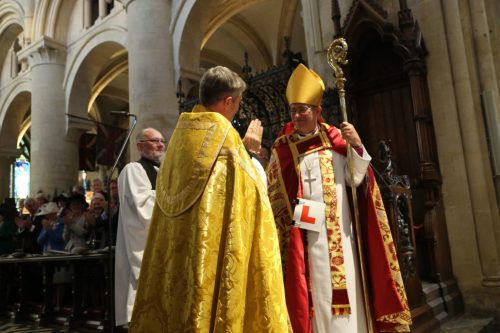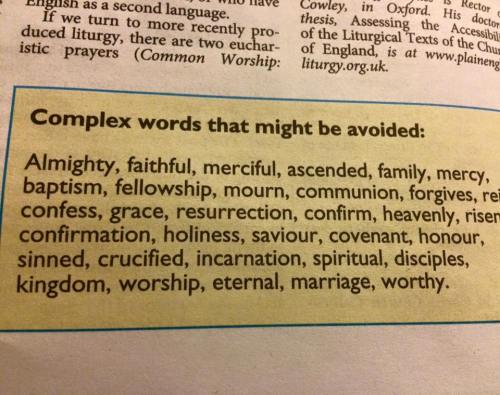
Are you sure this is right? – ed.
My Finals results may come out today. Or maybe tomorrow. So I’m returning to a topic I have already suggested on Twitter isn’t really worth talking about: Hats.
More particularly, mitres. Ian Paul has suggested recently that Bishops should ‘throw away’ their mitres, on the basis that they are unflattering, un-Anglican, recent, derived from the Old Covenant, symbolic of an ‘un-Anglican’ (again) suggestion that the Bishop dispenses the Holy Spirit at Ordination, and responsible in some hard-to-pin-down way for the ‘culture of deference’ identified in the Gibb report.
It is true that mitres aren’t worth talking about, if we are thinking in the context of the Church as a whole. Improving Safeguarding, dealing with clergy well-being, addressing the problems raised by the ordination of unauthorised bishops, getting stuck in to finding some sort of resolution to the conflict over how to welcome LGBT people, and above all, actually saving souls, are all far more significant than whether bishops wear hats.
However, the amount of traction the Rev. Dr. Paul’s blog post has got, in national newspaper and television news, suggests that it might be important after all.
Partly, we are in some kind of ecclesiastical ‘silly season’ – a non-story about valid matter for the eucharist in the Roman Catholic church has sparked outrage, even though it relates to the technicalities of how ‘gluten free’ or ‘low gluten’ bread is produced, and the Church of England has similar guidelines.
Partly, however, mitres remain almost synonymous with the Church. Bishops in chess are recognisable by their mitres, and visual language is an important way in which meaning is communicated. Ian Paul does recognise this – and suggests that what is being communicated is wrong, for the reasons detailed above.
The problem is, that his argument is just not as strong as it might appear at first glance.
Silliness
The argument about what looks ‘silly’ is entirely in the eye of the beholder, and certainly doesn’t lead to the conclusion that they should be abolished. Indeed, if mitres are ‘singularly unflattering,’ then it is hard to see how they can also contribute to a problematic ‘culture of deference’ – one does not show undue deference to one who ‘looks silly’!
More importantly, the concept of ‘looking silly’ ties into the more general ‘antitheatricality’ implicit in much of the arguments against vestments per se – the idea that if something is ‘theatrical’ it is somehow less ‘true’ or ‘honest,’ and a privileging of the text over the embodiment of that text. Simon Park’s post on the same topic argues that ‘in a world that loves a show, loves a bit of theatre, [the mitre] can play into that madness.’
The identification of ‘a show’ or ‘theatre’ with an (implicitly corrupt) ‘world,’ and the idea that it tends towards ‘madness’ is a very limited way in which to engage with the world of symbol and embodiment we encounter in liturgy.
Of course, any situation in which an individual stands in front of a group of individuals and commands their attention is ripe for abuse – this goes for a worship leader in a Christian guitar band just as much as for the bishop at a pontifical High Mass.
I would argue that the symbolism of the Mass in fact works, in part, to mitigate this by constantly pointing away from the celebrant and towards the sacramental reality that celebrant ministers, but the more important point is that we need more fine-grained tools than simply ‘theatre’ and ‘madness’ to engage with these dynamics.
I will return to this later, but I believe that it would be a grave mistake to simply assume that the ‘culture of deference’ identified by Gibb is the result of those parts of the Church with which we are already uncomfortable. This is particularly true if we then use the rhetoric of abuse in our already-simmering conflicts, since such a marriage of important pastoral work to old divisions can only be to the detriment of the kind of systematic self-examination, confession and reparation so desperately needed.
Old Covenant
I am not qualified to comment on the relationship with the Old Covenant mentioned in the original post, but I would note that we are not Marcionites, and there is at least a typological relationship between the ministry provided by the Aaronic priesthood and that provided by ordained ministers of contemporary Churches. Even if this is simply as broad-brush as ‘Aaronic priesthood is a type of Christ (as in Hebrews), Christian ministers follow Christ’s pattern’ we cannot simply discount something because it has an Old Testament analogue.
Un-Anglican?
The meat of Ian Paul’s argument, however, is that mitres are ‘un-Anglican,’ and ‘recent.’ This presumably builds on his earlier suggestion that Anglicanism doesn’t have ‘priests,’ and the BCP was wrong to so name the second order of ministry ‘Priesthood’ – ‘Presbyterate’ would be his preferred term. The first argument for the ‘un-Anglican’ nature of mitres is that they were abandoned at the Reformation, because they imply that the Bishop is no longer part of the laity, a view which would be alien to St Augustine. It is also a view which is alien to any even with a ‘high view’ of ordination. Augustine’s account of episcopacy remains an important one, and isn’t ‘watered down’ by the wearing of a mitre (or, by extension, any distinctive presbyteral vestments, which also indicate a ‘difference,’ and which it is highly likely Augustine would have worn).
I’m not an expert on the history of vesture, but it is certainly contentious to claim that the Reformation marked a full and clean break with the mitre. They were no longer worn with regularity, but remained a part of episcopal arms, appear on statues of bishops, and were occasionally carried at episcopal funerals, as detailed in a 1907 report (esp. pp. 104-7) prepared by a subcommittee of the Convocation of Canterbury. The same report suggests that Laud and other Caroline figures may have continued to wear the mitre, as may Cranmer.
Particularly strange is the argument that mitres represent the idea that bishops are the dispensers of the Spirit, and that Anglicans reject this understanding:
The bishop who ordained me believed that mitres were vital, because their flame-shaped outline symbolised the bishop as the dispenser of the Holy Spirit at confirmations and ordinations, something the liturgy actually contradicts: at no point does the bishop pronounce ‘I ordain you’, since the language is all about what God (and not the bishop) is doing.
It is true that the ordination service does not say ‘I ordain you.’ However, the BCP ordinal does not contradict, but strongly affirms, the notion that one role of the bishop in communion with his or her priests is precisely to dispense the Spirit:
Receive the Holy Ghost for the office and work of a Priest in the Church of God, now committed unto thee by the imposition of our hands. Whose sins thou dost forgive, they are forgiven; and whose sins thou dost retain, they are retained, and be thou a faithful dispenser of the Word of God, and of his holy Sacraments.
– Ordination Prayer, Ordering of Priests, Book of Common Prayer
That bishops and priests together lay hands is here irrelevant – priests alone cannot ordain, it is the ministry ‘by the imposition of [the bishop’s] hands’ which dispenses the Spirit, and the Spirit who in turn enables the Priests to dispense Word and Sacrament.
The importance of Spirit and Grace being given at the imposition of hands is underlined by being twice repeated in the prayer for the consecration of Bishops, also in the BCP. This is not a major point in Ian Paul’s argument, but it is important, since it suggests that it is not the mitre which reflects a misunderstanding of Anglican Orders, but rather his reasons for wishing to ‘throw it away.’ Changes to vesture must not indicate a change in the Church’s doctrine – and removing the mitre for implying that the bishop dispenses the Spirit at ordination would directly contradict the BCP Ordinal.
Abuse
As indicated above, Ian Paul also directly links the wearing of mitres to the ‘culture of deference’ condemned in the Gibb report. This seems like something of a ‘magic bullet’ argument: if we can create a spurious but plausible link between anything we personally don’t like and abuse, we place our opponents in the position of having to demonstrate outright both that there is no link and that they really do care about abuse.
Appealing as such argument are, I think it does a disservice to survivors of abuse to allow our response to abuse to be tangled up in ongoing ecclesiological disputes. Ian Paul himself rightly protested when Evangelical theology was linked to abuse, arguing that
The last thing we should do is use such incidents as ways to ‘score points’; it is the victims and the quest for both healing and justice which must remain at the centre
I fully agree with this – Evangelical theology is not necessarily abusive, and nor is Catholic theology. Abusers are abusive, and will use whatever tools are present in their traditions, workplaces, social circles, families, and communities to continue to perpetuate abuse.
Theology is one of those tools – but when we begin to recruit the response to abuse in the service of our own theological agendas, we fail those who should really be front and centre – and risk missing the ways in which we are all culpable for the abuses which happen in our midst.
Mitres, then. I still hold that there are more important things to talk about, but to reject them on the grounds put forward recently is itself un-Anglican, reflects a narrow anti-theatricality which leaves us unable to properly analyse power dynamics, and risks steamrollering the vital question of how we respond to abuse over a fancy-dress re-enactment of the Reformation debate.



